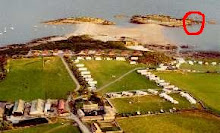Wednesday 29 August 2007
Macbeth - character view II
My view of Macbeth having now finished the play has changed dramatically. He started out courageous, patriotic and brave and ends as a cruel, perverse dictator. Macbeth becomes cruel and perverse because of the three witches who at first treat him as a plaything but when Hecate - who I see as the devil - tells them that they mustn't mess with human affairs and that they have to end it all they set about planning to have him killed through others. After "Great Birnam wood to high Dunsinane hill...come against him" Macbeth realises that the only person who can vanquish him is "the thane of Fife". He is not "woman born" and therefore fits the job application to kill him. But Macbeth, to his crebit, does not run and hide but stands and fights against the only person who can kill him. My mother told me that when a character opposes the gods and thinks themselves more powerful than the gods, the natural order of the world is upset. She also told me that when the character dies the audience experiences catharsis.
Monday 20 August 2007
Maceth III
Yesterday I finished reading Macbeth and I must admit that my early views of the play being boring have been completely obliterated. I realised that the saying "the spectre at the feast" came from Shakespeare and I also noticed that many famous sayings also came from Macbeth. After the feast I heard from the point of view of Lennox that Malcolm has become a (not too benevolent) dictator and that many fear him. When the witches meet Malcolm again and tell him that he will never die until "Great Birnam wood to high Dunsinane hill Shall come against him" I began to wonder if Macbeth's rule would ever end. The slaughter of lady Macduff and her sons also bring into sharp focus the evil of Macbeth's rule. When I learned that Lady Macbeth had descended into lunacy because of the burden of her deeds I understood that while this had weakened and destroyed her it had made Macbeth evil and strengthened him. When Malcolm gave the order for all of his soldiers to "hew him down a bough, And bear't before him" it suddenly dawned on me that Birnam wood was about to march to Dunsinane hill and "come against him". I found this so amusing that when the other "impossible" things that the apparitions had talked of happened I was not so surprised. Malcolm's hubris in thinking that he was immortal upset the order of the world and only when th e"hero" of the play had been slain did I relax and think "blimey that was good - no wonder Shakespeare's so famous".
Subscribe to:
Posts (Atom)
